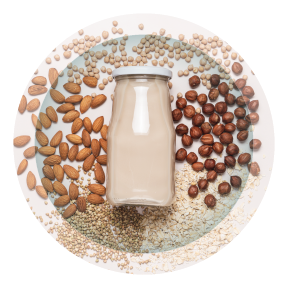By Julie Holt, Director, Global Advisory Services
The National Milk Producers Federation (NMPF) recently wrote a letter to the United States Food and Drug Administration (FDA) urging it to ban the word ‘milk’ in the labeling of synthetic dairy products. The NMPF is a farm-commodity policy organization representing the majority of United States dairy cooperatives, which accounts for two thirds of the U.S. milk supply. The NMPF argues that labeling plant-based alternatives made with synthetic dairy proteins as ‘milk’ violates the Federal Dairy Standard of Identity (SOI).
According to the NMPF, the term ‘milk’ should be reserved for the lacteal secretions of healthy cows, and using the term for synthetic alternatives may mislead consumers into believing they are natural traditional dairy products. The NMPF cites a specific example of a plant-based product made with precision fermentation-derived whey protein which claims to be “animal-free dairy milk.” The federation requests that the FDA ensure clear and accurate labeling of such products as a matter of protecting public health and preventing confusion in the market.

Earlier this year, the FDA issued draft guidance allowing ‘milk’ terminology to be used on plant-based milk alternatives (PBMA) product labels but recommended the inclusion of voluntary nutritional information to convey how the plant-based alternative compares with the nutritional profile of milk. Currently, there are many PBMA products available including soy, almond, oat, hemp, hazelnut, and cashew. Litigation around the nomenclature for these products is pending in at least two states, and lobbying for both plant-based and traditional dairy products is expected to increase.
FDA’s final guidance and any follow up legislation will impact plant-based dairy products significantly in terms of product nomenclature, labeling, and descriptors. The dairy industry has lobbied for over a decade to narrow the definition of ‘milk’ to include only natural animal-derived dairy products. Proponents of plant-based products are not entirely happy with FDA’s draft guidance either. Some challenge the recommendation that plant-based products should add labels to highlight nutritional differences from traditional milk on the basis that it makes the plant-based products appear nutritionally inferior.
Navigating the complexity of product development, staff training and ongoing compliance within a global marketplace can be challenging. FoodChain ID delivers high-level subject matter expertise for consulting based on your business needs, budget and timelines. Click here to learn more and get in touch with our team to discuss your next project.
Julie Holt, Director, Global Advisory Services

Julie Holt is a subject matter expert in the areas of food and beverage, additives, and regulatory strategy. She has beverage industry expertise and currently provides consulting support across multiple beverage categories. Ms. Holt has more than 25+ years of regulatory experience in the food and food ingredients industries and managed her own advisory firm, Scientific & Regulatory Solutions LLC, prior to joining FoodChain ID. As a consultant, Julie supported several food and beverage clients including a Fortune 50 company. Julie has provided global regulatory knowledge covering more than 200 countries. Her consulting efforts have supported global regulatory needs, R&D projects, sustainability goals, and innovation initiatives. Julie holds a Bachelor of Science in biology (emphasis in cellular / molecular biology) and organic chemistry and a master’s certificate in international food law from Michigan State University. She has also completed 30 hours of graduate studies in comparative biology and genetics and continues graduate studies, currently in pharmacology and clinical chemistry courses.










